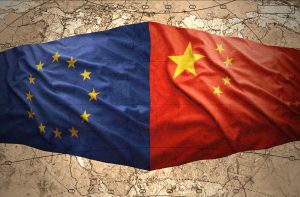“We know we are in a complicated phase of relations with China,” European Union trade chief Valdis Dombrovskis said recently, referencing the upcoming April 1 virtual summit between Brussels and Beijing. The summit arrives at an inopportune and awkward time for both sides. Russia’s recent invasion of Ukraine and China’s reluctance to condemn it has caused the EU’s 27 member states to “rethink” their ties with Beijing within a “new global context.” As a result, ratification of the previously much-hailed EU-China Comprehensive Agreement on Investment (CAI) seems less certain than ever and likely will not occur anytime soon.
The chilly sentiment is mutual. Amid political tensions with the West, Beijing has bolstered economic ties closer to home, most notably with the Regional Comprehensive Economic Partnership (RCEP) – arguably the largest free trade deal in world history – projected to add $500 billion to global trade by 2030. In a speech earlier this March announcing his annual work report to lawmakers, Chinese Premier Li Keqiang made no mention of trade deals with the United States or the EU, a notable departure from the past three years. The report itself also did not discuss trade with the United States.
The EU-China investment agreement has undergone a rocky journey since negotiations concluded in December 2020. At the time, members of both the outgoing Trump and incoming Biden administrations in the United States criticized the deal, arguing that it did not sufficiently address China’s use of forced labor, among other issues. Ratification of the agreement unraveled shortly afterward, starting in March 2021 when the EU sanctioned four Chinese officials involved with internment camps in Xinjiang. Beijing responded by imposing a raft of retaliatory sanctions against different EU officials and agencies, which led Brussels to officially suspend ratification talks that May. Back then, Dombrovskis said, “We cannot ignore the wider context of relations between the EU and China.”
As the April 1 summit nears, the bilateral relationship between Brussels and Beijing has only worsened. Last week, diplomats convened in Brussels to discuss an agenda for the upcoming summit: The top issue was Russia’s attack on Ukraine and not if, but how, to convince China to aid Ukraine. Another prominent issue will be China’s imposition of coercive sanctions against EU member state Lithuania over the latter’s decision to open a Taiwanese representative office, which has since resulted in a lawsuit against Beijing at the World Trade Organization.
To make matters worse, the investment deal’s biggest proponent in Europe, German Chancellor Angela Merkel, has since stepped down, further propelling the landmark EU-China investment deal into the dustbin of political infeasibility.
The current floundering of the EU-China investment treaty marks a rapid fall from grace. Before, many observers pointed to the agreement as a win for Beijing that would secure continued EU investment in China and thwart Washington’s efforts to block Beijing from the global trade regime. Back in 2020, Chinese President Xi Jinping personally intervened at the last minute to offer concessions over market access and save the deal, highlighting its importance to the Chinese government. Xi praised the pact as nurturing a “brighter future for cooperation” with Europe. The EU described the deal as “the most ambitious agreement that China has ever concluded with a third country,” lauding its comprehensive rules against forced technology transfer and requirements for increased transparency on subsidy and sustainability commitments. Now, such rhetoric seems like platitudes from a bygone era.
Vladimir Putin’s invasion of Ukraine and China’s unwillingness to stop it will be the hill upon which the EU-China investment agreement dies – at least for now. So far, it feels like “the best possible situation is a China that is neutral to slightly unhelpful,” said Ben Rhodes, a former official in the Obama administration. U.S. President Joe Biden’s recent video call with Xi, while lengthy, did not change much – Beijing still refuses to use the term “invasion.” Worse, EU leaders reportedly possess “very reliable evidence” that China is seriously considering providing military assistance to Russia.
While the investment deal will not progress in the near future, this does not mean the EU will decouple and diversify away from Beijing overnight, although Brussels has released plans to reduce such dependencies. The bloc of 27 member states remains China’s largest trading partner, exchanging $709 billion worth of goods and services in 2021, and critically depends on Chinese imports in 103 product categories across the electronic, chemical, mineral, and pharmaceutical industries. “Don’t forget that there is a lot at stake economically” in Europe’s trade relations with China, Steven Blockmans of the Centre for European Policy Studies told POLITICO.
Still, the question of whether the EU-China investment agreement stands a chance at ratification anytime soon will hinge upon Beijing’s next steps regarding Russia. And the early signs are less than promising.

































